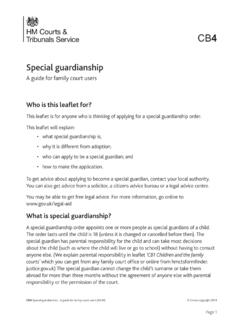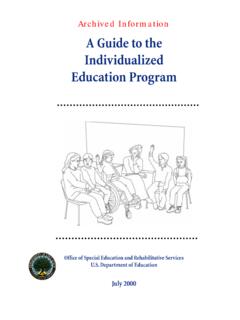Transcription of Guide to determining controlled work - GOV.UK
1 controlled work . Lord Chancellor's guidance on determining financial eligibility for controlled work and Family mediation (April 2021). CONTENTS. 1. Introduction General 2. How is financial eligibility determined? General 3. Does the client qualify financially? General Contributions for Legal Aid 4. General Principles of Determination Period of Calculation Aggregation of Means 5. determining Gross Income General Erratic Income (including the self employed). No income cases Disregarded income 6. determining disposable income allowances against income (figures are monthly unless otherwise stated). Dependants' allowances Tax and National Insurance Maintenance paid by the client Housing Costs Employment related expenses and child care expenses Criminal legal aid contributions 7. determining Disposable Capital General The client's share of joint assets when the partner is the opponent or contrary interest exists 1. Subject matter of the dispute Value of property Pensioner's disregard (Regulation 35).
2 8. Intentional deprivation of resources General 9. Eligibility of children General 10. Errors and new information General 11. Changes in circumstances General 12. Evidence of Means General Evidence of means 2. 1. Introduction General 1. The following guidance constitutes the Lord Chancellor's guidance for determinations in respect of an individual's financial resources, in accordance with Part 1 of the Legal Aid, Sentencing and Punishment of Offenders Act 2012 [ the Act ], for controlled work and family mediation . As in practice responsibility for financial determinations in respect of an individual for these services has been delegated to providers, this guidance is addressed to providers responsible for processing such cases. 2. Responsibility for financial determinations in respect of an individual has been delegated to providers for the following forms of civil legal services: (a) Legal Help;. (b) Help at Court;. (c) Help with Family mediation (d) Family mediation (e) Family Help (Lower).
3 (f) Legal Representation for proceedings in: (i) the Health, Education and Social Care Chamber of the First-tier Tribunal under the Mental Health Act 1983 or paragraph 5(2) of the Schedule to the Repatriation of Prisoners Act 1984;. (ii) the Mental Health Review Tribunal for Wales; or (iii) the Immigration and Asylum Chamber of the First- tier Tribunal; or where transitional arrangements These forms of civil legal services are all non-contributory if the client qualifies within the financial limits these services can be provided without payment of a contribution from income or capital. Family Help (Higher) and Legal Representation other than the categories above are not covered in this guidance, as the Director has not delegated responsibility to providers for making the financial determinations for such cases. Providers exercising delegated powers for emergency 1 Transitional Arrangements. Under changes that come into force on the implementation of the 2018 Standard Civil Contract, Legal Representation for proceedings in the Immigration and Asylum Chamber of the Upper Tribunal, in relation to an appeal or review from the Immigration and Asylum Chamber of the First-tier Tribunal, has become certificated work .
4 This work has moved from controlled work to certificated work under the 2018 Contract for matters started on or after 1 September 2018. If the controlled work matter that gave rise to the appeal to the Upper Tribunal started before 1 September 2018 transitional arrangements apply and the guidance herein is applicable to the financial determination. 3. representation should refer to the detailed guidance provided for certificated work [see Civil Representation Lord Chancellor's guidance on determining financial eligibility for Certificated work ]. 3. The financial limits and method of calculating disposable income and capital for the various forms of civil legal services are fixed in the Civil Legal Aid (Financial Resources and Payment for Services) Regulations 2013 as amended [ the Financial Regulations ]. References to regulations in this guidance are references to the Financial Regulations, unless otherwise stated. 2. How is financial eligibility determined?
5 General 1. The basis for making a financial determination is the same across all forms of civil legal services for which the provider is responsible. There are both income and capital limits for each form of civil legal services. These limits are set out in regulations 7 and 8 and are summarised in section 3 below. 2. Under regulation 5 certain cases are exempt from the requirement to make a determination in respect of the individual's financial resources. This includes legal help in contemplated proceedings or legal representation in proceedings or contemplated proceedings in relation to any matter described in paragraph 5(1)(a) or (b) (mental health and repatriation of prisoners) of Part 1 of Schedule 1 to the Act to the extent that the individual's case or application to the Health, Education and Social Care Chamber of the First-tier Tribunal or Mental Health Review Tribunal for Wales under the Mental Health Act 1983 or paragraph 5(2) of the Schedule to the Repatriation of Prisoners Act 1984 is, or is to be, the subject of proceedings before the Health, Education and Social Care Chamber of the First-tier Tribunal or Mental Health Review Tribunal for Wales.
6 Refer to the regulation 5 for the full list of exempted cases. 3. Unless a case is exempt from financial determination, the provider has, as a first step, to determine the client's financial eligibility on information provided by the client. This should be done on the requisite form provided by the Legal Aid Agency. 4. The forms must be completed in full and sufficient information held on file to allow the determination to be audited as necessary. See the 2018. Standard Civil Contract Specification ). 5. Reasonable steps, for instance requesting sight of the latest monthly pay slip (if the client is weekly paid it is best practice to obtain the latest 4 weekly pay slips to cover the full calculation period), must be taken to verify the information provided by the client. It is good practice to emphasise to clients the importance of giving a full and fair picture when they are applying for funding. The client is required under regulation 13 to provide information necessary to make the financial determination.
7 See 2018 Standard Civil 4. Contract Specification and the guidance within section 12 below, regarding evidential requirements. 6. Any determination that an individual is financially eligible for legal services must comply with all relevant regulatory and contractual provisions. Providers must apply the Lord Chancellor's Guidance contained herein, in relation to determining financial eligibility on assessment and any determination that an individual qualifies for services which is in direct conflict with this guidance will usually be considered manifestly unreasonable for the purpose of assessing costs at the end of the case. 3. Does the client qualify financially? General 1. Under regulation 7(4) for all forms of civil legal services the client's gross income must be 2657 per month or less; for clients with more than four child dependants (for whom they receive child benefit) a higher gross income limit applies (see paragraph 6 below). If the client's gross income exceeds this level then they are financially ineligible for civil legal aid and the application must be refused.
8 2. A client who is properly in receipt, directly or indirectly, of Income Support, Income-Based Jobseeker's Allowance, Income-Related Employment and Support Allowance, Guarantee Credit (under (3)(a) of the State Pension Credit Act 2002) or Universal Credit automatically satisfies the gross income test for all forms of civil legal service. The benefit must be currently in payment ( do not passport if claim is suspended) and the client must be legally entitled to the payment. If it is advised that the client is in receipt of a passporting benefit but there is a clear suspicion that the client is not in fact entitled to the benefit, the client has indicated that relevant facts such as a partner, employment, sources of income and capital etc. have not been advised to the benefit office, do not passport; carry out a full determination of means and include the state benefit received as income. 3. If the client is directly or indirectly in receipt of Asylum Support payments under or of the Immigration and Asylum Act 1999 (previously known as NASS support), they qualify automatically on gross income for the forms of civil legal services set out in regulation 6(1): Legal Help for matters described in paragraphs 24 to 30 (immigration and asylum) and 32(1) (victims of trafficking in human beings) of Part 1 of Schedule 1 to the Act, Help at Court and Legal Representation before the Immigration and Asylum Chamber of the First-tier 2 Transitional Arrangements.
9 For providers undertaking financial determinations where transitional arrangements apply: clients directly or indirectly in receipt of Asylum Support payments under or of the Immigration and Asylum Act 1999 will also qualify automatically on gross income for Legal Representation before the Immigration and Asylum Chamber of the Upper Tribunal, in relation to an appeal or review from the Immigration and Asylum Chamber of the First-tier Tribunal. 5. 4. Gross income for this purpose means income under regulation 21 (see section paragraph 6 below) before any deductions are made apart from those sums disregarded under regulation 24 (set out in section of this guidance) and any housing benefit paid under section 130 of the Social Security Contributions and Benefits Act 1992 or section 129 of the Social Security Contributions and Benefits (Northern Ireland) Act 1992. This gross income cap acts as a filter and a client whose gross income is below the relevant cap must then have their disposable income and disposable capital assessed in order to determine financial eligibility for civil legal services.
10 5. The relevant gross income cap can be ascertained by reference to the table below. No. of dependant children Monthly gross income cap from 0 4 2657. 5 2879. 6 3101. 7 3323. 8 3545. 9+ Add 222 per month for each additional child For the purpose of the gross income cap only, a child dependant is anyone for whom the client and/or their partner (if client and partner's resources are being aggregated) receives Child Benefit. 6. Both disposable income and disposable capital must also be within the eligibility limits in force at the time the application form is signed. Disposable income and capital refer to the income and capital after prescribed allowances and disregards have been applied. If either disposable income or capital are above the limits, the client will not be eligible for civil legal aid and the application must be refused. 7. A client who is properly in receipt, directly or indirectly, of Income Support, Income-Based Jobseeker's allowance, Income-Related Employment and Support Allowance, Guarantee Credit or Universal Credit automatically satisfies the disposable income test for all forms of civil legal services.

















